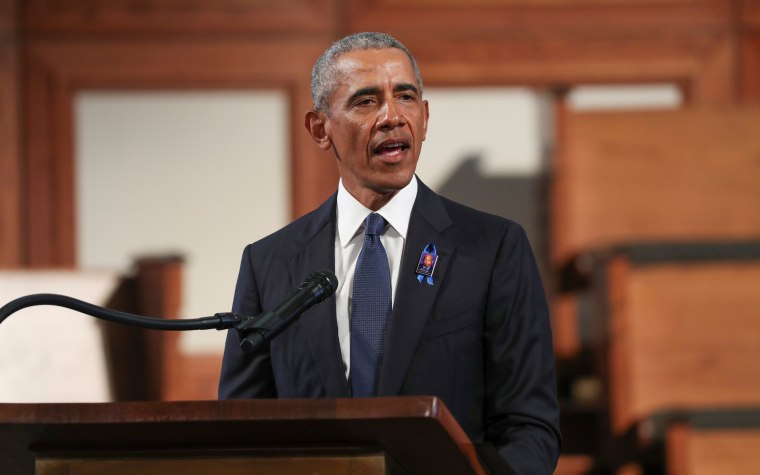Former President Barack Obama's eulogy for the late Rep. John Lewis (D-Ga.) was a powerful and poignant goodbye to an American hero. Unexpectedly, it also made some news, the significance of which is likely to reverberate for a while.
On the subject of voting rights -- a cause for which Lewis was prepared to give his life -- Obama explained, "We may no longer have to guess the number of jellybeans in a jar in order to cast a ballot. But even as we sit here, there are those in power who are doing their darnedest to discourage people from voting -- by closing polling locations, and targeting minorities and students with restrictive ID laws, and attacking our voting rights with surgical precision, even undermining the postal service in the runup to an election that is going to be dependent on mailed-in ballots so people don’t get sick."
Soon after, the former president talked about the best possible way to honor John Lewis and his legacy would be to revitalize American voting rights -- not only by restoring the Voting Rights Act gutted by conservative Supreme Court justices, but also by, among other things, advancing automatic voter registration, re-enfranchisement for former felons, expanding polling locations and early voting, and making Election Day a national holiday.
And it was that point at which Obama raised some eyebrows:
"[I]f all this takes eliminating the filibuster -- another Jim Crow relic -- in order to secure the God-given rights of every American, then that’s what we should do."
To be sure, this didn't come out of nowhere. For Obama, Republican procedural abuses were instrumental in stymieing some of his key priorities, especially in his first two years in the White House. There was some chatter in Democratic circles at the time about overhauling the chamber's rules and returning the Senate to a majority-rule institution.
That discussion has grown considerably louder, especially as Democrats consider the possibility of having control of the presidency and Congress in 2021. The Hill reported last month, "Democrats are stepping up talks about reforming or abolishing the filibuster if they win back the Senate and White House in November."
This conversation is necessary, and by any fair measure, unavoidable. In recent years, many Senate leaders from both parties have seen the existing cloture rules through an awkward partisan lens: Democrats and Republicans have been willing to tolerate mandates for 60-vote supermajorities because they know it allows them to stop many of the other side's ambitions.
But with that also comes the realization that nothing constructive can happen in federal legislating so long as the existing constraints remain in place -- and for a growing number of Democrats, that future is untenable.
Sen. Chris Coons (D-Del.), for example, made no secret of his opposition to getting rid of legislative filibusters, right up until last month, when the Delaware Democrat began to hedge. "I will not stand idly by for four years and watch the Biden administration's initiatives blocked at every turn," Coons said. "I am gonna try really hard to find a path forward that doesn't require removing what's left of the structural guardrails, but if there's a Biden administration, it will be inheriting a mess, at home and abroad. It requires urgent and effective action."
None other than former Vice President Joe Biden recently said something similar on the same issue. “I think it’s gonna depend on how obstreperous they become,” he said two weeks ago, adding, “ I have not supported the elimination of the filibuster because it’s been used as often ... the other way around [for Republicans benefit], but I think you have to just take a look at it.”
It's against this backdrop that Barack Obama -- almost certainly the most popular and powerful voice in national Democratic politics -- has decided to help tip the scales, adding his voice to the conversation.
The former president clearly realizes that, a year from now, a voting-rights bill may be under consideration. It may very well enjoy the support of a majority of the House, a majority of the Senate, a majority of the electorate, and the White House, but under existing procedural rules, that effort to expand voting rights would fail anyway.
It would be within Democrats' power, under these conditions, to change the rules and pass the bill. Obama believes that would be the right thing to do, which makes it that much more likely that it might actually happen, opening the door to progressive governance that would otherwise be impossible.
Postscript: For those who've been away from the debate for a while, I'd recommend this piece from Vox's Ian Millhiser, who explained yesterday that the Senate filibuster is "a historical accident that became a tool of white supremacy."

